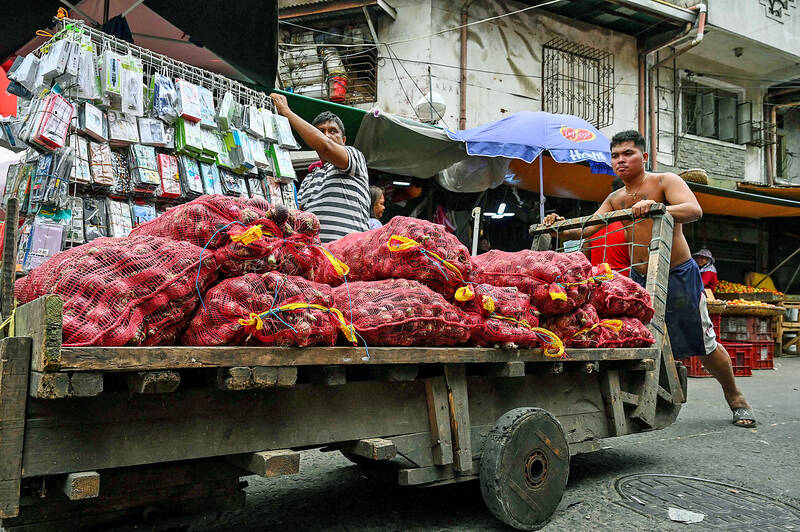Even before his onions are fully grown, Philippine farmer Luis Angeles races to harvest the crop and cash in on eye-watering prices for a vegetable that has become a luxury item in the country.
Onion prices have soared in the past few months, reaching as high as 800 pesos (US$14.67) per kilogram in Manila supermarkets, making them more expensive than chicken or pork.
Some restaurants have stripped the staple ingredient from dishes, while many families already grappling with the highest inflation in 14 years have stopped eating them.

Photo: AFP
To meet demand and push retail prices back below 200 pesos, the government has approved the importation of 21,000 tonnes of onions and faces calls to crack down on traders suspected of hoarding.
However, prices remain stubbornly high and onion farmers like Angeles have been harvesting earlier than usual to reap the windfall.
“What is happening is historic,” Angeles, 37, said, as his workers pulled undersized red and white bulbs out of the soil near the northern town of Bongabon, the country’s self-proclaimed “onion capital.”

Photo: AFP / Handout / RR Productions
“This is the first time that prices have reached this level,” he said.
When he began harvesting last month, Angeles received as much as 250 pesos per kilogram for his crop.
By the time his onions reached Manila supermarket shelves, the price had more than doubled, exceeding the daily minimum wage.
“I told my family: ‘Let’s just smell the onion instead of eating it,’” Candy Roasa, 56, said as she walked through a market in the capital where she has seen vendors selling bulbs the size of a small child’s fist for as much as 80 pesos each.
As onion memes spread on social media, the humble vegetable has become a symbol of wealth in the poverty-afflicted country.
At least one bride used pricey bulbs instead of flowers for her wedding bouquet.
Philippine Airlines crew members on a recent flight from the Middle East were busted trying to smuggle a few bags of the pungent commodity through Manila’s Ninoy Aquino International Airport.
It is not the first time the Philippines has experienced a shortage of a basic food staple that caused prices to spike — sugar, salt and rice have all been hit in the past.
Poor yields, high costs, insufficient investment in irrigation and machinery, lack of access to cold storage facilities and farm-to-market roads, and crop-destroying typhoons have long affected the sector.
Pest outbreaks as well as soaring oil and fertilizer prices since Russia invaded Ukraine last year have only added to farmers’ woes.
Despite government pledges to boost domestic food production, the country relies heavily on imports to feed its growing population — but tariffs fuel inflation.
Philippine President Ferdinand Marcos Jr appointed himself agriculture secretary to overhaul the near-moribund industry, which accounts for about one-quarter of the country’s employment, but only makes up 10 percent of GDP.
“Our agriculture sector is significantly challenged,” said Geny Lapina, an agricultural economics and management professor at the University of the Philippines.
Every Filipino eats an average of 2.34kg of onions per year and theoretically the country produces enough to meet the demand, official data showed.
Since the tropical climate only allows one planting per year of the rain-averse crop, stocks are consumed or spoil well before the next harvest.
The recent lifting of COVID-19 restrictions, which allowed the resumption of food-focused festivals and family gatherings for Christmas, triggered soaring demand for onions.
Former secretary of agriculture William Dar said the shortage could have been avoided if the current government had allowed imports in August last year.
“This is the net result of the poor planning,” Dar told local broadcaster ABS-CBN.
There are growing concerns about future food security in the Philippines, which is ranked among the most vulnerable nations to the effects of climate change and is plagued by poor nutrition.
The median age of farmers is 57 and the average farm plot has shrunk to about 1.3 hectares from nearly 3 hectares in the 1960s.

‘TERRORIST ATTACK’: The convoy of Brigadier General Hamdi Shukri resulted in the ‘martyrdom of five of our armed forces,’ the Presidential Leadership Council said A blast targeting the convoy of a Saudi Arabian-backed armed group killed five in Yemen’s southern city of Aden and injured the commander of the government-allied unit, officials said on Wednesday. “The treacherous terrorist attack targeting the convoy of Brigadier General Hamdi Shukri, commander of the Second Giants Brigade, resulted in the martyrdom of five of our armed forces heroes and the injury of three others,” Yemen’s Saudi Arabia-backed Presidential Leadership Council said in a statement published by Yemeni news agency Saba. A security source told reporters that a car bomb on the side of the road in the Ja’awla area in

‘SHOCK TACTIC’: The dismissal of Yang mirrors past cases such as Jang Song-thaek, Kim’s uncle, who was executed after being accused of plotting to overthrow his nephew North Korean leader Kim Jong-un has fired his vice premier, compared him to a goat and railed against “incompetent” officials, state media reported yesterday, in a rare and very public broadside against apparatchiks at the opening of a critical factory. Vice Premier Yang Sung-ho was sacked “on the spot,” the state-run Korean Central News Agency said, in a speech in which Kim attacked “irresponsible, rude and incompetent leading officials.” “Please, comrade vice premier, resign by yourself when you can do it on your own before it is too late,” Kim reportedly said. “He is ineligible for an important duty. Put simply, it was

SCAM CLAMPDOWN: About 130 South Korean scam suspects have been sent home since October last year, and 60 more are still waiting for repatriation Dozens of South Koreans allegedly involved in online scams in Cambodia were yesterday returned to South Korea to face investigations in what was the largest group repatriation of Korean criminal suspects from abroad. The 73 South Korean suspects allegedly scammed fellow Koreans out of 48.6 billion won (US$33 million), South Korea said. Upon arrival in South Korea’s Incheon International Airport aboard a chartered plane, the suspects — 65 men and eight women — were sent to police stations. Local TV footage showed the suspects, in handcuffs and wearing masks, being escorted by police officers and boarding buses. They were among about 260 South

Syrian President Ahmed al-Sharaa on Sunday announced a deal with the chief of Kurdish-led forces that includes a ceasefire, after government troops advanced across Kurdish-held areas of the country’s north and east. Syrian Kurdish leader Mazloum Abdi said he had agreed to the deal to avoid a broader war. He made the decision after deadly clashes in the Syrian city of Raqa on Sunday between Kurdish-led forces and local fighters loyal to Damascus, and fighting this month between the Kurds and government forces. The agreement would also see the Kurdish administration and forces integrate into the state after months of stalled negotiations on